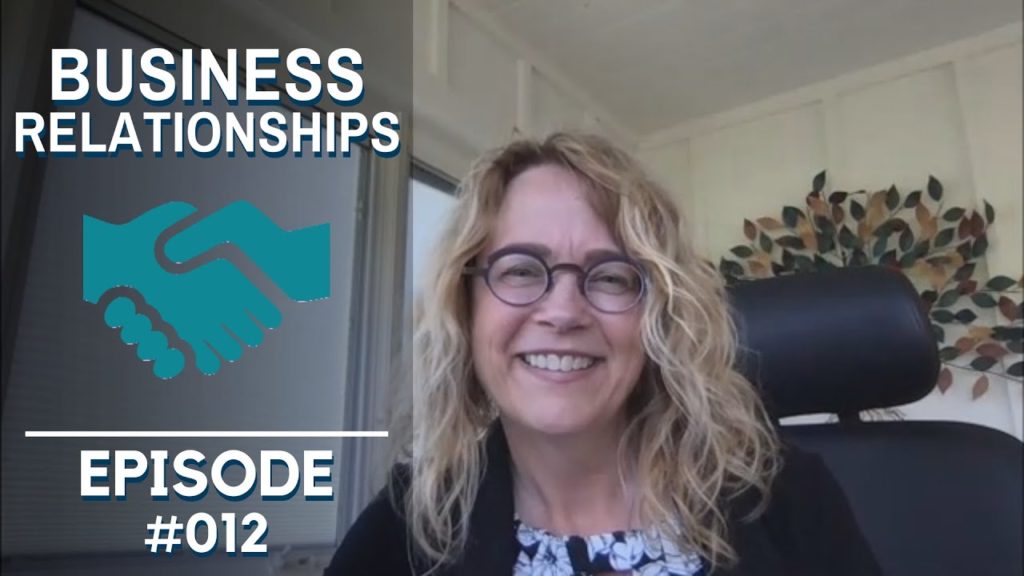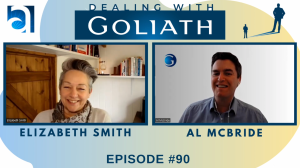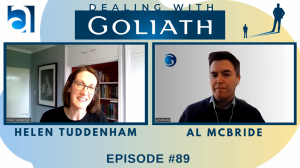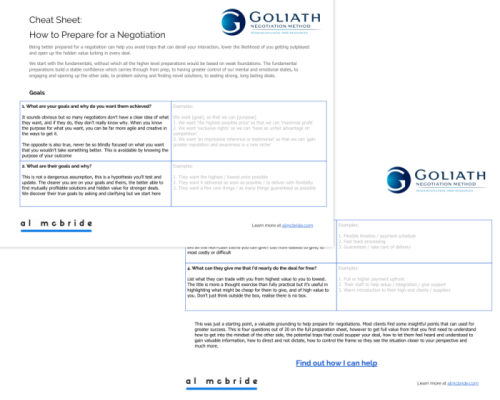Show Notes:
Dr. Nancy Jonker PhD, has over 31 years of experience in the leadership transformation space and has mentored over 220 leaders on five different continents. A large portion of her work has focused on helping business partners and leaders remove roadblocks that have kept them stuck.
She is the author of ‘Get Your Power On’ and founder of the Audacious Leaders MO, a program that helps business owners achieve their goals by mastering their mindset, leveraging their signature strengths, and skilfully communicating with their partners and teams.
In this episode we discuss:
- The biggest problem with business owners when they’re suffering a complication with their partners
- The number one roadblock in that situation facing business owners
- The two major issues in trying to solve that problem and why those approaches don’t work
- The benefits of ‘dwelling in possibility’
- To make an improvement you first have to be able to visualise it
- The ‘Tip Toe No More Quickstart Guide’
Transcript
Welcome to the dealing with Goliath podcast. The mission of dealing with Goliath is to sharpen the psychological edge in business leaders with skin in the game, who want to be more effective under pressure, uncover hidden value, and increase profitability, revealing gems and resources from experts across the business spectrum, the format. This is the double espresso shot of insight to boost business performance, using our intense five questions in nine minutes format. I’m your host Al McBride, a coach facilitator, trainer, and creator of the Goliath negotiation method.
Al McBride 0:38
Our guest today on the show is Dr. Nancy Jonker. Nancy Jonker. PhD, has over 31 years of experience in the leadership transformation space and has mentored over 220 leaders on five different continents. A large portion of our work has focused on helping business partners and leaders remove roadblocks that have kept them stuck. She is the founder of the audacious leaders mo a program that helps business owners achieve their goals by mastering their mindset, leveraging their signature strengths, and skillfully communicating with their partners and teams. Welcome, Nancy, great to have you on the show.
Dr Nancy Jonker 1:18
Thank you so much our privilege to be here.Al McBride 1:21
It’s brilliant to have you. So let’s dive straight in. So as I said, we have nine minutes, I’m just going to start the clock here. So our nine minutes starts now. So question one, who is your ideal client on what’s the biggest challenge they face?Dr Nancy Jonker 1:39
Well, my my ideal client are business owners in some sort of partnership. So often, it could be family owned businesses, Father, Son, mother, daughter, some combination of that siblings, cousins, there’s a lot at stake. And there’s a partnership that people generally want to preserve.
Dr Nancy Jonker 2:00
It doesn’t have to be family own people could be just business partnerships, where people are doing business together. And there’s some sort of complication going on. And they’re not exactly sure how to solve it. And so the biggest challenge that I find with these business owners is that they’re not on the same page with their partner and their don’t know how to get on the same page so that they can move forward.
Dr Nancy Jonker 2:29
And what I found is that it often is a breakdown in clarity, communication and trust. That is that number one roadblock that people face, and and so and sometimes they don’t realize that that’s what the challenges, they just know that business isn’t as much fun as it used to be.
Dr Nancy Jonker 2:47
They start daydreaming about doing other things, maybe family members or friends complain because they’re preoccupied or never have energy, that kind of thing. Oftentimes there can be like a breakdown in health. And so the challenge starts in the business, but then it rapidly ripples out.
Al McBride 3:06
Right. Yeah, it spills out, as you say, it sounds like this. Sounds like there’s a lot more effect on the personal life and all the relationships around, as you say around the business, which if you’re merely an employee or an in a more professional partnership, that will be less so the issue. I mean, instead of business people are still people in business.
Al McBride 3:28
But as you said, it’s all the more so in the family and friends are more involved. Right. Okay, very interesting stuff. So just have seven minutes left there on the clock. But what sort of question number two, what are some of those common mistakes people make when trying to solve or trying to address the problem that you’re talking about?
Dr Nancy Jonker 3:46
Yes. Well, again, I described it sometimes it’s almost like people feel like they’re behind a herd of buffalo. And anything they want to do to resolve things feels tricky or risky. And so the common mistakes, oddly enough, it’s one of two things, it’s either ignoring the problem or it’s focusing on it too much.
Dr Nancy Jonker 4:07
So in the ignoring the problem, it is sort of like that buffalo herd up in front, and they’re just trying to make do, right trying to get along, do their work arounds, that kind of thing. And, and they might start to see some of their self care ago that like we talked about, like the stress starts to ripple out, they might be drinking more than they like giving up exercise, not having very much leisure time, it’s having an effect, but they’re just trying to plod along.
Dr Nancy Jonker 4:38
The other side of it, the biggest mistake that I see is that they focus a lot on the problem, right? And so they go in, they’re gonna fix the problem. And it typically goes in a cycle because they’ll try something. Maybe there’s an eruption or big withdrawal and everyone goes to their separate corners for a while and and so that kind of cycle just repeats itself until the resignation may fit in. And and so is that kind of focusing too much instead of focusing on what they want. And so I don’t remember what your next question might be. So I’ll stop there and see
Al McBride 5:22
what comes next. It we’re just coming up on five minutes to go. But question three is similar to that of links in nicely with what’s one valuable free action or approach that the audience can implement that will help with that issue. So either as you say they’re ignoring it, or they’re spending way too much focus on it. So how can they address it in a very proactive but positive or optimistic manner?
Dr Nancy Jonker 5:46
Yeah, well as in so many things, the very first step is to take a step back. And to widen the view on it, I call it dwell in possibility. And really focusing on what they want not and what the problems are, and how it’s limiting them or trying to ignore it, right. But it’s always this kind of cloud.
Dr Nancy Jonker 6:08
And so the free action that I would recommend for people is to spend time visualizing what they want that partner relationship to look like, what they want their day at the office, when people can go to the office, right, what they want those interactions to look like to feel like to sound like.
Dr Nancy Jonker 6:30
Then to visualize actually graded improvement in it. They don’t need to know the how exactly, but if they can start to imagine things improving, that can go a long, long way. Because the first change occurs in the theater of the mind. And the brain doesn’t know the difference between what’s real, and what’s imagined. And so when we can imagine the solutions that we want, we have gone a long ways to creating the solutions that we want.
Al McBride 7:03
That’s timing stuff. And I love that I love that dwelling, dwelling in the possible because as you said, it just flips it into positives flips into the things that you have control over as well. And it gives that lovely clarity of the clarity of knowing when things are on that trajectory of getting better when you’re clearly out.
Al McBride 7:22
No, I’m closer to that than I was before. So brilliant stuff. So with that in mind, and three minutes to go there. What is one valuable free resource that you could direct people to that will help with that process? with that issue?
Dr Nancy Jonker 7:36
Yes. So I have created a quickstart guide, and I’ve named it tip toe no more. Because that is what we see as people being kind of careful.
Al McBride 7:47
And the eggshells.
Dr Nancy Jonker 7:50
It goes through my seven simple yet powerful steps. And mindset being one of them understanding signature strengths and what we bring to the table. And and creating, really that space for people to be themselves and to do their own work. So the it’s called the “quickstart guide tip toe no more: how to have what you want from your business, even if your partner wants something else”. And so that’s available on my website, NancyJonker.com/guide. And it’s Nancy Jonker, j o n ke r.com.
Al McBride 8:30
To proper German spelling. Excellent. That’s exactly it’s a great place to start with trying to resolve some of those issues. It’s brilliant stuff. So just with just two minutes left to go, what’s one question I should have asked you. That will be great value to the audience.
Dr Nancy Jonker 8:46
I think the the question that’s worth asking is why audacious leaders MO? Because I had to come to terms with Why did I choose that right. And so what I have discovered as an entrepreneur, and what I’ve learned from other business owners is that it takes some real audacity to push forward to get out of our comfort zone to own a business to do what’s necessary, and to show up as our authentic selves, right, because, you know, Berne Brown talks about brave leaders.
Dr Nancy Jonker 9:25
I talk about audacious leaders because being authentic and vulnerable and still knowing how to lead from that position is a really important thing, I think. And when I was leading a group for audacious women, we came up with the tagline, audacious, gracious and tenacious.
Dr Nancy Jonker 9:47
And I think actually, that sums it up really well. We’re not talking about being audacious in a brash kind of way, but it’s actually speaking about what’s true. And when you’re resolved to do that, you can actually be Be very gracious.
Dr Nancy Jonker 10:02
And then of course, we all need that tenacious aspect to our behavior when we’re when we’re working in any kind of a business. And then I’ll just finish up here with the mo part, the modus operandi.
Dr Nancy Jonker 10:14
When we know our signature strengths, when we know our style of getting work done, and and can really embrace that and run with it, then we can also create a culture where people are free to be themselves.
Dr Nancy Jonker 10:31
And what I find is that where there are issues of conflict or so on, it de-personalizes the conflict when people know their styles, you and I were talking earlier about different assessment tools and different personality ones. But the one I use is actually about how people instinctively solve problems, how their mental energy is arranged, and it helps them know how to be more efficient in the day, but also creates that space for using others strengths as well as their own.
Al McBride 11:03
Fantastic, fantastic. And you’re right, I think, you know, audacious is a great word for it. Because it sums up that idea of bravery that people couldn’t people fall into that it’s not comfortable. But it’s that just gut reaction of anger or disappointment, or all of those sort of less helpful emotions.
Al McBride 11:21
But it takes it does take a certain level of bravery, bravery or audacity to actually confront the problem, but in a humane way, in a loving way almost. That moves you through that, as you say, and that that’s that’s very interesting stuff. So it’s brilliant stuff. Thank you. Thank you so much for being on the show, Nancy.
Dr Nancy Jonker 11:41
Oh, you’re welcome.
Al McBride 11:42
Now, all links will be of course below the video and in the show notes if you’re listening to this on the podcast, so super stuff. All right. Well, hope to talk to you again soon. And best of luck. Thank you. Thank you very much.
Transcribed by https://otter.ai
Resources
- Dr Nancy Jonker: ‘Tit-Toe No More’ Free Quick Start Guide
- Dr Nancy Jonker’s: Audacious Leader Podcast
- Amazon Book: Get Your POWER On!: A Woman’s Guide to Becoming Confident and Effective in Business, Life and Relationships, by Dr Nancy Jonker
Connect with Nancy Jonker:
NancyJonker.com: https://nancyjonker.com/
LinkedIn: https://www.linkedin.com/in/nancyjonker/
Ready for More:
If you’re interested in more, visit almcbride.com/minicourse for a free email minicourse on how to gain the psychological edge in your negotiations and critical conversations along with a helpful negotiation prep cheat sheet.




